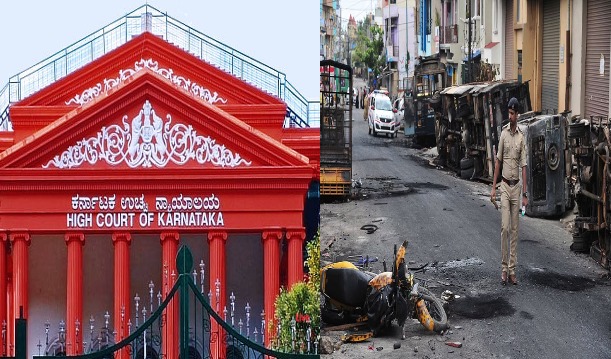
The Karnataka High Court recently refused to dismiss an order of a National Investigation Agency (NIA) special court taking cognizance of offences committed by one of the defendants in the 2020 Bangalore riots case.
A single bench of Justice M Nagaprasanna observed that as per the investigation, it was established that the accused coordinated with the movements and activities of the other accused, and was in constant touch with people who attacked police personnel.
As a result, the bench determined that there was prima facie evidence of the commission of unlawful activities under the Unlawful Activities (Prevention) Act (UAPA).
“The investigation established the petitioner coordinating with the movements and activities of the other accused persons. He was in constant touch and was meeting the participants who conspired and decided to carry out the violent attack on the police personnel. Therefore, there is prima facie material in the charge sheet against the petitioner for alleging the offences under the Act,” the order reads.
Justice Nagaprasanna was considering a writ petition filed by the accused, Mohammed Shariff, seeking a reversal of the special court’s order on the grounds that it lacked application of mind.
Appearing for the petitioner, Advocate Mohammed Tahir stated that no allegations against him involved UAPA violations. At best, he may be charged with offences punishable under the Indian Penal Code (IPC). As a result, he maintained that the NIA court’s conduct of the trial was illegal, because the court is only concerned with offences under Section 15 (terrorist act) of the UAPA.
Special Public Prosecutor P Prasanna Kumar representing the NIA, on the other hand, maintained that the accused offences clearly fell under the purview of Section 15 UAPA and that the special court has jurisdiction to trial offences under both the IPC and UAPA. As a result, he asserted that the special court applied its mind, as evidenced by the chargesheet.
The petitioner and other accused were charged of employing inflammable devices or explosives to burn vehicles and destroy public property in order to disturb national security.
As a result, it found that Section 15 of the UAPA’s requirements had been met prima facie and that the allegation that the special court could not convene a trial may be dismissed. The bench also determined that the accused violated Section 18 of the UAPA (conspiracy).
Counsel Nagaprasanna further argued that, despite the passing of two years, no progress had been made in the trial and urged that it be completed within a certain time limit.
However, due to the large number of defendants awaiting trial, the Court concluded that the motion could not be approved due to the case’s distinctive circumstances.




